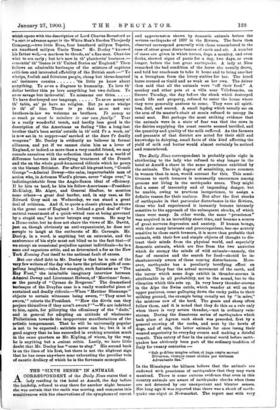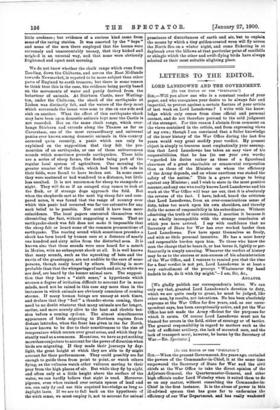THE "SIXTH SENSE" IN ANIMALS.
ACORRESPONDENT of the Daily News states that a lady residing in the hotel at Amalfi, the day before the landslip, refused to stay there for another night because she was certain that the earth was moving, and compares this sensitiveness with the observations of the symptoms of unrest and apprehension shown by domestic animals before the serious earthquake of 1897 in the Riviera. The facts then observed correspond generally with those remembered in the case of other great disturbance! of earth and air. A number of cases are given in which horses, dogs, a monkey. and even ducks, showed signs of panic for a day, two days, or even longer, before the last great earthquake. A lady at Nice remarked the bad condition of the horse she usually drove, and told her coachman to take it home and to bring another in a brougham from the livery stables for her. The hired horse seemed as timid and as weak as her own. The driver then said that all the animals were "off their feed." A monkey and other pets at a villa near Villefranobe, on Shrove Tuesday, the day before the shock which destroyed much life and property, refused to enter the house where they were generally anxious to come. They were all spirit- less, dull, and scared. A small lapdog which usually sat on the arm of its master's chair at meals refused to occupy its usual seat. But perhaps the most striking evidence that the animals were in a state of fear was that the cows in the dairies supplying the coast resorts seemed terrified, and the quantity and quality of the milk suffered. As the farmers and peasants of that district are noted for their skill and knowledge in dairying, small facts of this kind affecting the yield of milk and butter would almost certainly be noticed and remembered.
The Daily News correspondent is probably quite right in attributing to the lady who refused to stay longer in the hotel at Amalfi a share in the same prescience exhibited by the animals. The high degree of sensibility, more common in woman than in man, would account for this. This sensi- tiveness to earth tremors is necessarily uncommon among persons not living in the earthquake zones. They might feel a sense of insecurity and of impending danger, but be unable, owing to previous inexperience, to assign a definite reason for their malaise. But after the first shocks of earthquake in that particular disturbance in the Riviera, those who had experienced it instantly became intensely sensitive to the approach of the subsequent shocks, of which there were many. In other words, the same " prescience " was acquired in an incredibly short time, and became a source of great nervous depression and anxiety. If human beings, with their many interests and preoccupations, become acutely sensitive to these earth tremors, it is more than probable that animals, with their few and simple objects of thought to dis- tract their minds from the physical world, and especially domestic animals, which are free from the two anxieties which do occupy the minds of wild animals—namely, the fear of enemies and the search for food—should be in- stantaneously aware of these coming disturbances. More- over, earthquake has a peculiarly terrifying effect on animals. They fear the actual movement of the earth, and the terror which some dogs exhibit in thunder-storms is attributable in all probability, not to the sound, but to the vibration which this sets up. In very heavy thunder-storms in the Alps the Swiss cattle, which wander at will on the upper pastures, come galloping down the rocky paths to their milking ground, the example being usually set by " la mere," the mistress cow of the herd. The goats and sheep often follow them, and it is noted that they do this as a rule only when there is very severe thunder,—not in ordinary rain- storms. During the disastrous series of earthquakes which took place at Agram each shook was preceded, first by a general crowing of the cocks, and next by the howls of dogs, and of cats, the latter animals for once losing their wonted superiority to everyday events and making a doleful tumult. This outcry of fear in the animal world before earth- quakes has obviously been part of the ordinary tradition of Italy for twenty centuries :— " Sub pedibus mugire solum et jugs ccepta woven Silvarum, visteque canes ulalare per umbram Adventante des."
In the Himalayas the hillmen believe that the animals are endowed with prescience of earthquakes that they may warn mankind. There is some curious evidence that even in this country animals are aware of earthquake shocks when these are not detected by our unexpectant and blunter senses. Not long ago it was reported that there was a shock of earth- quake one night at Newmarket. The report met with very
little credence ; but evidence of a curious kind came from some of the racing stables. It was asserted by the " boys " and some of the men there employed that the horses were extremely and unaccountably uneasy, that they kicked and neighed in an unusual way, and that some were obviously frightened and upset next morning.
We do not know whether the chalk range which runs from Reading, down the Chilterns, and across the East Midlands towards Newmarket, is reputed to be more subject than other parts of England to earth tremors; but there is some reason to think that this is the case, the evidence being partly based on the movements of water and partly derived from the behaviour of animals. At Shirburn Castle, near Watling- ton, under the Chilterns, the shock of the earthquake at Lisbon was distinctly felt, and the waters of the deep moat which surrounds the house were seen to rise on one stile and sink on another. What the effect of this earthquake shock may have been upon domestic animals kept near the Castle is not recorded. But on the same chalk range, which over- hangs Shirburn and extends along the Thames as far as Cavershaw, one of the most extraordinary and universal panics ever known among domestic animals in this country occurred quite recently, a panic which can only be explained on the supposition that they felt the pre- monition of an earthquake, or one of those subterranean sounds which sometimes precede earthquakes. These hills are a series of sheep farms, the flocks being part of the regular local system of agriculture. One morning the greater number of the flocks, which had been left safe in their folds, were found to have broken out. In some cases they were scattered or had wandered to a distance, but little loss resulted. It is not uncommon for sheep to stampede at night. They will do so if an escaped stag comes to look at the flock, or if strange dogs approach the fold. But when the shepherds met at the next big sheep fair and com- pared notes, it was found that the range of country over which this panic had occurred was far too extensive for any such belief to be possible. Nor could it have been mere coincidence. The local papers contented themselves with chronicling the fact, without suggesting a reason. That no earthquake-shock was felt does not make it impossible that the sheep felt or heard some of the common premonitions of earthquake. The roaring sound which sometimes precedes a shock has been heard by human ears at a distance of nearly one hundred and sixty miles from the disturbed area. It is known also that these sounds were once heard for a month in Mexico, with no subsequent shock at alL It is well known that many sounds, such as the squeaking of bats and the rustle of the grasshopper, are not audible to the ears of some persons, though easily heard by others. Nothing is more probable than that the whisperings of earth and air, to which we are deaf, are heard by the keener animal ears. The supposi- tion that they have a "sixth sense," a hypothesis which arouses a degree of irritation difficult to account for in some minds, need not be raised in this case any more than in the instances in which animals are obviously conscious of coming storms. If many human beings are uneasy at such times, and declare that they " feel " a thunder-storm coming, there need be no doubt whatever that many animals are far longer, earlier, and more acutely alive to the heat and electric ten- sion before a coming cyclone. The almost simultaneous appearance of birds migrating to Northern regions from distant latitudes, when the frost has given in the far North, is now known to be due to their sensitiveness to the rise of temperature which occurs over great areas, and which they in- stantly read as a summons. Meantime, we have as yet nothing more than conjecture to account for the power of direction when birds are migrating. If they made their journeys by day- light, the great height at which they are able to fly might account for their performances. They could possibly see far enough to guide them from point to point, or watch others flying, as the vultures watch other vultures moving to their prey from the high planes of air. But while they fly by night, and often only at a little height above the surface of the water, we can hardly believe that sight is used. Moreover. pigeons, even when trained over certain spaces of land and sea, can only fly and use this acquired knowledge as long as daylight lasts. If we are to fall back on the hypothesis of the sixth sense, we must employ it, not to account for animal
prescience of disturbances of earth and air, but to explain the means by which a tiny golden-crested wren will fly across the North Sea on a winter night, and come flickering in at daybreak over the billows at that particular point of sandhills or shingle which the other and swift-flying birds have always selected as their most suitable alighting place.



















































 Previous page
Previous page